

25 Ways To Fuck With Your Characters. As storyteller, you are god.

And to be frank, you’re not a particularly nice god — at least, not if you want your story to resonate with readers. A good storyteller is a crass and callous deity who treats the characters under his watchful eye like a series of troubled butt-puppets. From this essential conflict — storyteller versus character — a story is born. The 25 Most Stylish Men on TV: Style. 5 Things Nobody Tells You About Being Poor. Being poor is like a game of poker where if you lose, the other players get to fuck you.

And if you win, the dealer fucks you. A bunch of you reading this are among the 45 million "working poor" in America, and if you're not, you know somebody who is. Like me. Getty.comOr 60 percent of all retired NBA players, according to this site. N9LbN.jpg (JPEG Image, 455x621 pixels) Photo Album. Derek Sivers: Weird, or just different? How to Write Like You Love It: Stephen King and 6 Tools Every Writer Should Have in His ToolBox. In his Memoir of the Craft , Stephen King breaks up his book into three parts: 1) memories of his personal and professional life told in numbered chunks and fragmented snippets; 2) what's in his toolbox and what should be in yours; and 3) comments on the actual craft of writing.
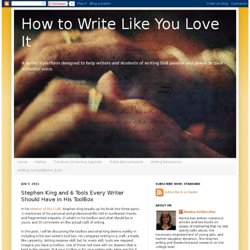
In this post, I will be discussing the toolbox and what King deems worthy in including in his own writer's tool box. He compares writing to a craft, a trade, like carpentry. Writing requires skill, but for every skill, tools are required. Take this, my body of water: Archive. What's the coolest thing your Dad did where you knew what he was doing, and he said "Never tell Mom"? : AskReddit. Kurt Vonnegut on the Shapes of Stories. The Proletarian Writer. Broadcast in the Home Service of the B.B.C., 6 December 1940; printed in The Listener, 19 December 1940.
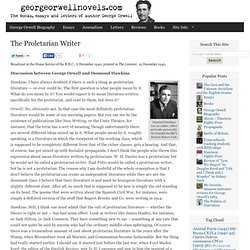
Discussion between George Orwell and Desmond Hawkins Desmond Hawkins was an author, editor and radio personality. He founded the BBC's Natural History Unit. Hawkins: I have always doubted if there is such a thing as proletarian literature — or ever could be. The first question is what people mean by it. Orwell: No, obviously not. Hawkins: Still, I think one must admit that the cult of proletarian literature — whether the theory is right or not — has had some effect. Orwell: I think it is simply a matter of education. Hawkins: Then, after all, the appearance of the proletariat as a class capable of producing books means a fresh development of literature — completely new subject-matter, and a new slant on life?
Orwell: Yes, except in so far as the experience of all classes in society tends to become more and more alike. Hawkins: And how about language and technique? Orwell: Oh yes, lots. #54 – Writing Hacks, Part 1: Starting. By Scott Berkun, Aug. 28 2006 (#54) Writing is easy, it’s quality that’s hard.
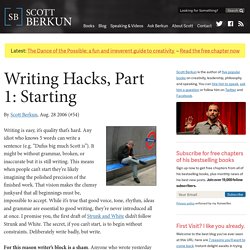
Any idiot who knows 5 words can write a sentence (e.g. “Dufus big much Scott is”). Film School: How to write an ending- Flixist. Good afternoon, class.
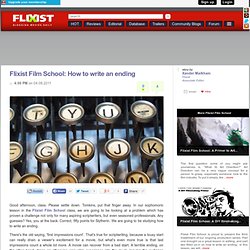
Please settle down. Tomkins, put that finger away. In our sophomoric lesson in the Flixist Film School class, we are going to be looking at a problem which has proven a challenge not only for many aspiring scriptwriters, but even seasoned professionals. Any guesses? Yes, you at the back. There's the old saying, 'first impressions count'. Let's start off with the basics. I'm not going to go through what each part means, partly because it would take too long and partly because it's fairly self-explanatory, but having the structure laid out in a graph like the one above does illustrate an important point about endings.
That point is that they are just as important when developing your plot as the beginning and the middle. A Flappers' Dictionary. Hidden deep within a box of materials that came into the shop this week was a short stack of old magazines.
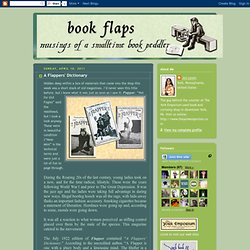
I’d never seen this title before, but I knew what it was just as soon as I saw it: Flapper. “Not for Old Fogies” said the masthead, but I took a look anyway. These were in beautiful condition (“Near Mint” is the technical term) and were just a lot of fun to page through. During the Roaring 20s of the last century, young ladies took on a new, and for the time radical, lifestyle. These were the years following World War I and prior to The Great Depression. It was all a reaction to what women perceived as stifling control placed over them by the male of the species. The July 1922 edition of Flapper contained “A Flappers’ Dictionary.” “The flapper movement is not a craze, but something that will stay,” the author maintained.
The dictionary went into some detail, listing the group’s slang and providing definitions.